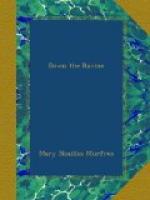Birt’s impulse was to adopt the word. But he had seen enough of falsehood. He had done with concealment.
“I did tech it,” he said boldly, “but I hain’t got it. I put it back in the pocket o’ the coat.”
Jube Perkins laid a sudden hand upon his collar. “’Tain’t no use denyin’ it, Birt,” he said with the sharp cadence of dismay. “Gin the grant back ter Nate, an’ mebbe he won’t go no furder ’bout’n it. Stealin’ a paper like that air a pen’tiary crime!”
Birt reeled under the word. He thought of his mother, the children. He had a bitter foretaste of the suspense, the fear, the humiliation. And he was helpless. For no one would believe him! His head was in a whirl. He could not stand. He sank down upon the wood-pile, vaguely hearing a word here and there of what was said in the crowd.
“His mother air a widder-woman,” remarked one of the group. “An’ she air mighty poor.”
Andy Byers was laughing cynically.
Absorbed though he was, Birt experienced a subacute wonder that any one could feel so bitterly toward him as to laugh at a moment like this. How had he made Andy Byers his enemy!
Nobody noticed it, for Nate was swaggering about in the crowd, enjoying this conspicuous opportunity to display all the sophistications he had acquired in his recent trip to Sparta. He was calling upon them to witness that he did not care for the loss of the grant—the paper was nothing to him!—for it was on record in the land office, and he could get a certified copy from the register in no time at all. But his rights were his rights!—and ten thousand Diceys should not trample on them. Birt had doubtless thought, being ignorant, that he could destroy the title by making away with the paper; and if there was law in the State, he should suffer for it.
And after this elaborate rodomontade, Nate strode out of the tanyard, with the obsequious Tim following humbly.
Birt told his story again and again, to satisfy curious questioners during the days that ensued. And when he had finished they would look significantly at one another, and chuckle incredulously.
The tanner seemed to earnestly wish to befriend him, and urged him to confess. “The truth’s the only thing ez kin save ye, Birt.”
“I’m tellin’ the truth,” poor Birt would declare.
Then Jube Perkins argued the question: “How kin ye expec’ ennybody ter b’lieve ye when ye say Tennessee purvented ye from takin’ the grant—ennything the size o’ leetle Tennie, thar.”
And he pointed at the little sister, who was perched upon the wood-pile munching an Indian peach.
Somehow Birt did not accurately define the moral force which she had wielded, for he was untaught, and clumsy of speech, and could not translate his feelings. And Jube Perkins was hardly fitted to understand that subtle coercion of affection.
When he found that Birt would only reiterate that Tennie “kem along unbeknown an’ purvented” him, Jube Perkins gave up the effort at last, convinced of his guilt.




